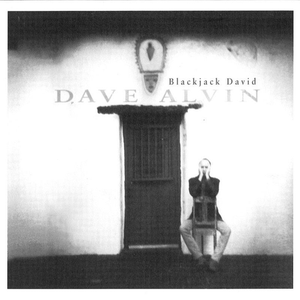Published on Jul 8, 1998
Where the hell has Dave Alvin been in my decade-plus of
reviewing music?
Of course Alvin earned immortality with his work in The
Blasters, not to mention his stint with punk stalwarts X. But Alvin
might just be in the best part of his career – where he’s polished
his ability to tell a story through the words and music of his
songs. His latest release
Blackjack David is one of the most incredible albums I’ve
ever heard, and places Alvin up in the ranks of such musicians as
Townes Van Zandt, Jim Croce and Harry Chapin.
The album is very folk and country influenced, styles which
blend with the deep baritone of Alvin’s voice. The eleven songs
contained in this album tell the stories of the downtrodden in the
world, painting their bleak pictures with some of the brightest
colors – yet leaving enough room for a ray of optimism in some of
the numbers.
The stories told on
Blackjack David are incredibly moving and powerful. “From A
Kitchen Table,” which ranks as one of my favorites on the album,
shows the struggles of a man who is trapped in the town he grew up
in and the only way of life he knows. The song features the
protagonist pouring his heart and frustrations out like no other
fine poetry could capture – but whether it helps or not, Alvin
leaves that decision up to the listener.
Likewise, “1968” is a tale of the inner demons a Vietnam War
veteran faces, and the constant reminder that he lost his childhood
friend in the war. The words of the song (co-written by Alvin and
Chris Gaffney) create a portrait of almost any town you could
imagine – and, unfortunately, could well be a true tale told by
many people.
Alvin’s penchant for folk can be found on the title track (a
traditional number whipped into shape by Alvin) and “Mary Brown,” a
song which brings out the Van Zandt influences in Alvin’s music.
The song is one of the best modern-day folk numbers I’ve heard in a
very long time, almost sounding like a song that could have come
from the glory days of the genre.
Alvin throws in touches of the blues (“New Highway,” “The Way
You Say Goodbye”) and country (“Laurel Lynn”) throughout
Blackjack David, but he is able to pull such shifts in style
off flawlessly. Assisting Alvin is an incredible collection of
musicians, including the album’s producer Greg Leisz.
No matter what style of music is the flavor of the month, music
such as that on
Blackjack David always seems to appeal to people. Bob Dylan
knew it. Bruce Springsteen knew it. So, too, does Dave Alvin,
though only time will show if he will achieve the level of success
his peers did. For Alvin’s sake, I hope he does.
Blackjack David is not only one of the most beautiful and
moving albums I’ve heard in a long time, but also the best album
I’ve heard all year. In fact, other releases this year are going to
have a hard time knocking this one off the top of my “Best Of 1998”
list.
